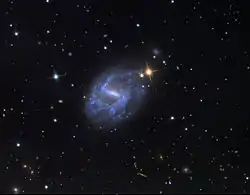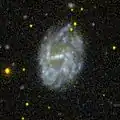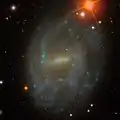NGC 7741
NGC 7741 is a barred spiral galaxy located in the constellation Pegasus. It is located at a distance of circa 40 million light years from Earth, which, given its apparent dimensions, means that NGC 7741 is about 50,000 light years across. It was discovered by William Herschel on September 10, 1784.[2]
| NGC 7741 | |
|---|---|
 NGC 7741 by the 32-inch Schulman Telescope at Mount Lemmon Observatory Credit: Adam Block/Mount Lemmon SkyCenter/University of Arizona | |
| Observation data (J2000 epoch) | |
| Constellation | Pegasus |
| Right ascension | 23h 43m 54.4s[1] |
| Declination | +26° 04′ 32″[1] |
| Redshift | 0.002502 ± 0.000001 [1] |
| Helio radial velocity | 750 ± 0 km/s[1] |
| Distance | 41.2 ± 6.9 Mly (12.6 ± 2.1 Mpc)[1] |
| Apparent magnitude (V) | 11.0 |
| Characteristics | |
| Type | SB(s)cd [1] |
| Apparent size (V) | 4′.4 × 3′.0[1] |
| Other designations | |
| UGC 12754, CGCG 476-125, MCG +04-55-050, PGC 72237[1] | |
NGC 7741 has a strong bar and two spiral arms. The spiral arms are patchy and diffuse and their inner part forms a pseudoring.[3] There are numerous HII regions along the bar and the spiral arms, and a total number of 10 HII region complexes have been observed, with radius 6 arcseconds. They have ages between 5 and 9 million years.[4] The star formation rate in the central region of NGC 7741 is 0.022 M☉ per year per square kpc.[5] The total stellar mass of NGC 7741 is estimated to be 1.69×109 M☉.[6]
NGC 7741 belongs to a small galaxy group known as the NGC 7741 group. Other members of the group are the galaxies UGC 12732, and UGC 12791.[7]
Gallery
 NGC 7741 by GALEX
NGC 7741 by GALEX NGC 7741 (SDSS DR14)
NGC 7741 (SDSS DR14)
References
- "NASA/IPAC Extragalactic Database". Results for NGC 7741. Retrieved 2016-01-18.
- Seligman, Courtney. "NGC 7741 (= PGC 72237)". Celestial Atlas. Retrieved 19 November 2018.
- Eskridge, Paul B.; Frogel, Jay A.; Pogge, Richard W.; Quillen, Alice C.; Berlind, Andreas A.; Davies, Roger L.; DePoy, D. L.; Gilbert, Karoline M.; Houdashelt, Mark L.; Kuchinski, Leslie E.; Ramirez, Solange V.; Sellgren, K.; Stutz, Amelia; Terndrup, Donald M.; Tiede, Glenn P. (November 2002). "Near‐Infrared and Optical Morphology of Spiral Galaxies". The Astrophysical Journal Supplement Series. 143 (1): 73–111. arXiv:astro-ph/0206320. Bibcode:2002ApJS..143...73E. doi:10.1086/342340. S2CID 15491635.
- Khramtsova, M. S.; Wiebe, D. S.; Lozinskaya, T. A.; Egorov, O. V. (October 2014). "Optical and infrared emission of H ii complexes as a clue to the PAH life cycle". Monthly Notices of the Royal Astronomical Society. 444 (1): 757–775. arXiv:1407.8307. Bibcode:2014MNRAS.444..757K. doi:10.1093/mnras/stu1482. S2CID 118527414.
- Tsai, Mengchun; Hwang, Chorng-Yuan (14 July 2015). "Star formation in the central regions of active and normal galaxies". The Astronomical Journal. 150 (2): 43. Bibcode:2015AJ....150...43T. doi:10.1088/0004-6256/150/2/43.
- Font, J.; Beckman, J. E.; Martínez-Valpuesta, I.; Borlaff, A. S.; James, P. A.; Díaz-García, S.; García-Lorenzo, B.; Camps-Fariña, A.; Gutiérrez, L.; Amram, P. (2 February 2017). "Kinematic Clues to Bar Evolution for Galaxies in the Local Universe: Why the Fastest Rotating Bars are Rotating Most Slowly". The Astrophysical Journal. 835 (2): 279. arXiv:1702.01743. Bibcode:2017ApJ...835..279F. doi:10.3847/1538-4357/835/2/279. S2CID 55782342.
- Makarov, Dmitry; Karachentsev, Igor (21 April 2011). "Galaxy groups and clouds in the local (z∼ 0.01) Universe". Monthly Notices of the Royal Astronomical Society. 412 (4): 2498–2520. arXiv:1011.6277. Bibcode:2011MNRAS.412.2498M. doi:10.1111/j.1365-2966.2010.18071.x. S2CID 119194025.
External links
| Wikimedia Commons has media related to NGC 7741. |
- NGC 7741 on WikiSky: DSS2, SDSS, GALEX, IRAS, Hydrogen α, X-Ray, Astrophoto, Sky Map, Articles and images
- NGC 7741 on SIMBAD